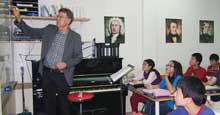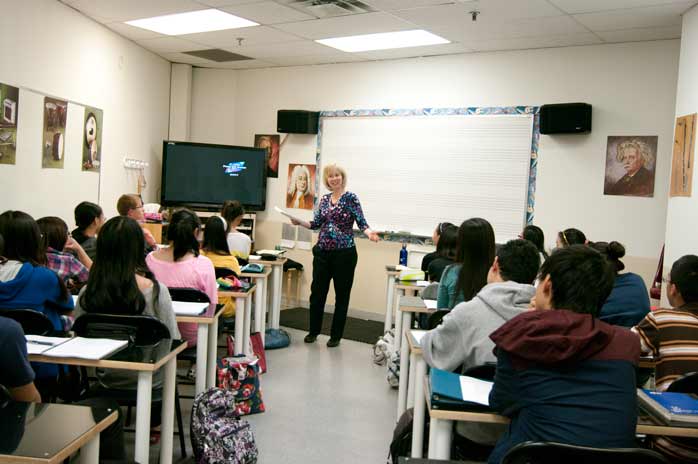Theory Certificates
Level 5 Theory Certificate: Level 5 Theory Exam.
Level 6 Theory Certificate: Level 6 Theory Exam
Level 7 Theory Certificate: Level 7 Theory Exam
Level 8 Theory Certificate: Level 8 Theory Exam
Level 9 Theory Certificate: Level 9 History and Level 9 Harmony Exams
Level 10 Theory Certificate: Level 10 History and Level 10 Harmony & Counterpoint Exams
Level ARCT Theory Certificate: Level ARCT History, Level 10 Harmony & Counterpoint, and ARCT Analysis Exams
Class Details
Level 5 Theory is recommended for students age 9 and younger who are taking their practical grade 4 examination. Features treble and bass clef, key signatures to four sharps/flats, intervals, Italian terms and other musical note activities. Study allotment 30-60 minutes per day (3-5 hours per week). Prerequisites: Grade 4 or beginning Grade 5 piano. Next Class
Comprehensive Level 5-6 Theory is recommended for students age 10 and younger who have passed their practical grade 5 examination. Features treble and bass clef, key signatures to four sharps/flats, intervals, Italian terms and other musical note activities. Study allotment 30-60 minutes per day (3-5 hours per week). Prerequisites: Grade 4 or beginning Grade 5 piano. Next Class
Comprehensive Level 5-8 Theory is recommended for students who have passed the practical grade 6 examinations. A grade 12 high school credit is earned when paired with the grade 8 performance exam. Features treble and bass clef, all key signatures, scales, triads, cadences, intervals, Italian terms. Study allotment 45 minutes per day (4-6 hours per week). Next Class
Comprehensive Level 5-8 Theory is a fast-track class for motivated students who complete homework assignments each week. An average time allotment would be 60 minutes per day (5-6 hours per week). During the last 3-4 weeks of class, theory students will need to intensify their efforts in order to prepare for the examination. Class attendance is essential. Students should read pitch names quickly and accurately, understand common meter signatures ( 2/4, 3/4, 4/4, 3/8 and 6/8), and understand the divisions of basic rhythmic values as well as dotted notes. Next Class
Level 9 Harmony is the study of chord progressions that comprise music. To feel comfortable, students need to review key signatures, chords and their technical names (tonic, dominant, etc.) which were covered in Level 8 Theory prior to the first class. If a year or more has passed since the Level 8 Theory exam, students will have forgotten a substantial amount placing them at a disadvantage. Prerequisites: Level 8 Theory. Next Class
Level 9 History presents an overview of Baroque, Classical, Romantic and Modern composers and works. Because students are uninitiated in old school memory work, it is the most difficult. Definitions/terms form the heart of the material and absorbing vocabulary is the number one priority. Other components include composer’s works, biographies and piece descriptions. Prerequisites: Level 8 Theory. Next Class
Level 10 Harmony & Counterpoint is a continuation of Level 9 Harmony with more extensive use of minor keys and modulation. Three new chords are introduced and students are asked to compose a 16 bar melody. Figured bass realization. Harmonic and form analysis of sonata form, rondo, minuet and trio and the smaller forms are taught. Prerequisites: Level 8 Theory, Level 9 Harmony. Next ClassLevel 10 History: (Next Class) Presents the music of the Medieval and Renaissance with additional music genres of Baroque and Classical. Focus is on definitions/terms, piece descriptions and style. Due to the unfamiliarity of the early periods, exam results will be jeopardized with missing the first classes. Prerequisites: Level 8 Theory & Level 9 History.
ARCT Harmony & Counterpoint (Next Class) A continuation of Level 10 Harmony & Counterpoint. Four new chromatic chords are introduced. Students compose a 2-part 16 bar composition. Complete an composition for solo instrument and keyboard part with figured base. Analysis includes chromatic harmony and remote modulations. Best taken before ARCT Analysis: Level 8 Theory, Level 9 Harmony, Level 10 Harmony. Co-requisites: ARCT Analysis and ARCT History
ARCT Analysis (Next Class) Includes harmonic analysis of Classical and Romantic songs, sonatas and fugues. Structural analysis of large forms includes sonata, sonata-rondo, rondo, fugue and songs. Prerequisites: Level 8 Theory, Level 9 Harmony, Level 10 Harmony and Counterpoint. Best taken after Co-requisites: ARCT Harmony & Counterpoint and ARCT History.
ARCT History (Next Class) A wonderful romp through major Romantic and 20th century composers (Liszt, Ravel), their styles and representative works. Emphasis is on style and piece descriptions. Adding a touch of fun, students study Canadian composers and performers such as Glen Gould, Louis Lortie and Join Mitchell. Prerequisites: Level 9 History and Level 10 History. Co-requisites: ARCT Harmony Counterpoint and ARCT Analysis.
Upcoming Theory Classes for Royal Conservatory of Music Exams
Private Online Lessons are offered in all theory subjects. (See Private Theory Packages)
Call for details: 905-479-0591



